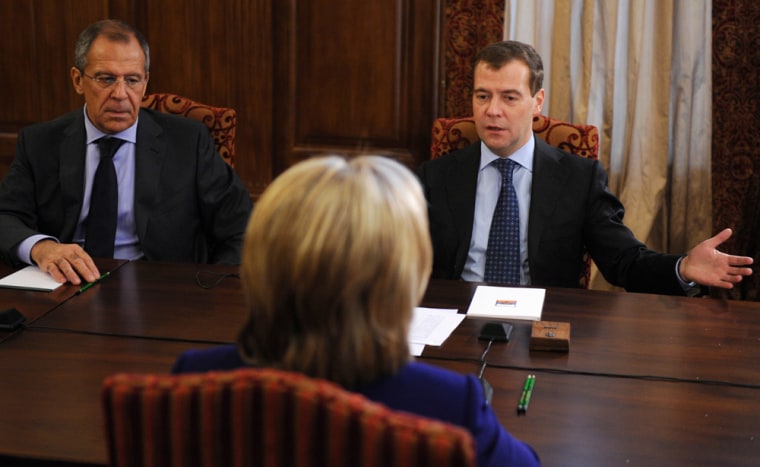Secretary of State Hillary Rodham Clinton's failure to win Russian support for tougher talk on Iran exposed a divide between the two powers on how best to push Iran into accepting limits on its nuclear ambitions.
The setback does not doom the Obama administration's hopes for diplomatic progress this year on Iran. Nor does it nix another high-priority administration goal: reversing a recent slump in relations with Moscow.
But it muddies the outlook for persuading Iran that painful penalties loom if the regime fails to satisfy U.S. and international concerns that its nuclear program is aimed at building atomic weapons.
On her visit to Moscow this week — her first since becoming secretary of state — Clinton had hoped for a public signal that Russia would consider new sanctions if Iran refused to come clean about its nuclear intentions. Just last month, Russian President Dmitry Medvedev had raised American hopes by saying that while sanctions are rarely productive "in some cases they are inevitable."
U.S. officials hailed his statement as a shift in tone, but on Tuesday, Russian Foreign Minister Sergey Lavrov seemed to backtrack by saying his government believes that threatening to impose further sanctions is counterproductive as long as diplomacy has a chance to succeed.
"At the current stage, all forces should be thrown at supporting the negotiating process," Lavrov said at a joint Moscow news conference with Clinton. "Threats, sanctions and threats of pressure in the current situation, we are convinced, would be counterproductive."
'No need to scare the Iranians'
Where Washington and Moscow seem to split is on the value of publicly threatening sanctions while diplomacy is still in progress.
A nuclear-armed Iran could be a threat to Russia. But at the same time, Russian support for international sanctions might sour important trade deals with Tehran, especially in armaments and nuclear technology. Worse, Iran might decide to lend clandestine aid to Muslim separatists in the Russian Caucasus.
Russian Prime Minister Vladimir Putin sharpened that point Wednesday during a visit to Beijing. He said talking about sanctions is premature.
"We believe that we should treat this issue with caution, and there is no need to scare the Iranians," Putin said.
Iran's nuclear program, partly enabled by Russia, has been a source of friction between Washington and Moscow for more than a decade. Both, however, say they strongly oppose Iran becoming a nuclear power — an ambition that the Iranians deny.
Doubts about Iran's claim of a purely peaceful purpose for its nuclear program were deepened by the disclosure last month that it was secretly building a second facility to produce nuclear fuel.
Since then, Iran has agreed to open that uranium enrichment facility to international inspection on Oct. 25 and to ship a large portion of its enriched uranium to Russia for further processing and use in a Tehran research reactor. Those moves are seen as positive but not conclusive steps in the right direction.
Walking a tightrope
Andrew Kuchin, senior Russia analyst at the Center for Strategic and International Studies, said in an interview Wednesday that Medvedev's apparent openness to sanctions does not necessarily contradict the skepticism from Lavrov and Putin.
"The accent is somewhat different but there is some consistency," he said, since the Russian government's basic stance is that imposing further sanctions should be a last resort after other options fail.
In the U.S. view, the threat of further sanctions — backed by Russia — would be a powerful incentive for the Iranians to comply with demands for unfettered inspection of their nuclear facilities and for freezing production of enriched uranium.
The U.N. Security Council has already imposed three rounds of sanctions on Iran, including a ban on trade in goods that have both a civilian and a military use.
The U.S. is not advocating any new sanctions at this stage. It hopes to avoid that path by keeping Iran on track toward demonstrating that its nuclear program is for peaceful purposes. Sanctions are a fallback option in the event the Iranians come up short on that count.
So in its dealing with the U.S. on Iran, Moscow is walking a tightrope, on the one hand joining Iran in scolding the West for its alleged imperial ambitions and talking down sanctions, while warning that it will not tolerate a nuclear-armed Iran on the other.
